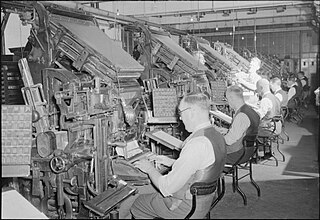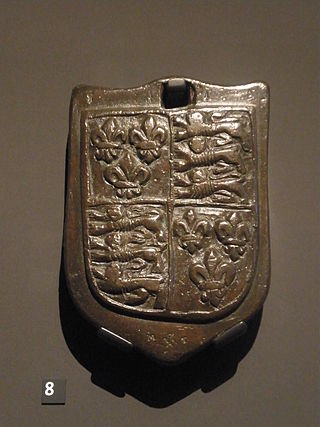Related Research Articles

The history of British newspapers begins in the 17th century with the emergence of regular publications covering news and gossip. The relaxation of government censorship in the late 17th century led to a rise in publications, which in turn led to an increase in regulation throughout the 18th century. The Times began publication in 1785 and became the leading newspaper of the early 19th century, before the lifting of taxes on newspapers and technological innovations led to a boom in newspaper publishing in the late 19th century. Mass education and increasing affluence led to new papers such as the Daily Mail emerging at the end of the 19th century, aimed at lower middle-class readers.

Oliver Goldsmith was an Anglo-Irish writer best known for his works such as The Vicar of Wakefield (1766), The Good-Natur'd Man (1768), The Deserted Village (1770) and She Stoops to Conquer (1771). He is thought by some to have written the classic children's tale The History of Little Goody Two-Shoes (1765).

The Corn Laws were tariffs and other trade restrictions on imported food and corn enforced in the United Kingdom between 1815 and 1846. The word corn in British English denoted all cereal grains, including wheat, oats and barley. The laws were designed to keep corn prices high to favour domestic farmers, and represented British mercantilism. The Corn Laws blocked the import of cheap corn, initially by simply forbidding importation below a set price, and later by imposing steep import duties, making it too expensive to import it from abroad, even when food supplies were short. The House of Commons passed the corn law bill on 10 March 1815, the House of Lords on 20 March and the bill received royal assent on 23 March 1815.
This article contains information about the literary events and publications of 1844.

William Coxe was an English historian and priest who served as a travelling companion and tutor to nobility from 1771 to 1786. He wrote numerous historical works and travel chronicles. Ordained a deacon in 1771, he served as a rector and then archdeacon of Bemerton near Salisbury from 1786 until his death.

John Perceval, 2nd Earl of Egmont was a British politician, political pamphleteer, and genealogist who served as First Lord of the Admiralty. Of Anglo-Irish background, he sat in both the Irish and British Parliaments. He was the father of the Regency Era Prime Minister Spencer Perceval.

The Vicar of Wakefield, subtitled A Tale, Supposed to be written by Himself, is a 1766 novel by Anglo-Irish writer Oliver Goldsmith (1728–1774). It was written from 1761 to 1762 and published in 1766. It was one of the most popular and widely read 18th-century novels among the British citizenry, and remains a classic of English literature.

The stone or stone weight is an English and British imperial unit of mass equal to 14 avoirdupois pounds (6.35 kg). The stone continues in customary use in the United Kingdom and Ireland for body weight.
Hugh Kelly was an Irish dramatist and poet. From the 1760s he was employed as a propagandist for the British government, attacking members of the Opposition. After arriving in London in 1760 to work as a staymaker, he soon turned to become a writer and made a living as a journalist. In 1766 he published Thespis, a long poem about the acting profession, which gained him wide attention. He followed up this success with the novel Memoirs of a Magdalen in 1767. He ultimately became known for his stage plays such as False Delicacy and A Word to the Wise.
The McClatchy Company, or simply McClatchy, is an American publishing company incorporated under Delaware's General Corporation Law. Originally based in Sacramento, California, U.S., the publication became a subsidiary of Chatham Asset Management, headquartered in Chatham Borough, New Jersey as a result of its 2020 bankruptcy. The publication operates 29 daily newspapers in fourteen states and has an average weekday circulation of 1.6 million and Sunday circulation of 2.4 million. In 2006, it purchased Knight Ridder, which at the time was the second-largest newspaper company in the United States. In addition to its daily newspapers, McClatchy also operates several websites and community papers, as well as a news agency, McClatchy DC Bureau, focused on political news from Washington, D.C.
William Newmarch was an English banker, economist and statistician.

John Baker Holroyd, 1st Earl of Sheffield, was an Anglo-Irish politician and soldier. He was a leading authority on agriculture and commerce and appointed President of the Board of Agriculture in 1803. He is also remembered as the close friend and patron of eminent historian Edward Gibbon, to whom he acted as literary executor and editor.
Francis Wollaston was a British astronomer and Church of England priest. He was elected a Fellow of the Royal Society in 1769.
Farmers Guardian is a weekly newspaper aimed at the British farming industry. It provides comprehensive and topical news with Livestock, Arable and Machinery sections; as well as business information and latest market prices. It is sold nationally and is published each Friday. Based in Preston, Lancashire, it was for many years owned by United Business Media but it, and sister title Pulse, were sold to UK business-to-business publisher AgriBriefing in February 2012 in a deal worth £10 million.

William Robert FitzGerald, 2nd Duke of Leinster, KP, PC (Ire) was an Irish liberal politician and landowner. He was born in London.

The Reverend William Jackson was a noted Irish preacher, journalist, playwright, and radical. He served first as a preacher and private chaplain of the Church of England before moving into journalism, writing for several newspapers in London across both sides of the political aisle.

Thomas de Grey, 2nd Baron Walsingham PC, was a British politician who sat in the House of Commons from 1774 to 1781 when he succeeded to the peerage as Baron Walsingham. He served as Joint Postmaster General and was for many years Chairman of Committees in the House of Lords.
The history of journalism in the United Kingdom includes the gathering and transmitting of news, spans the growth of technology and trade, marked by the advent of specialised techniques for gathering and disseminating information on a regular basis. In the analysis of historians, it involves the steady increase of the scope of news available to us and the speed with which it is transmitted.
Crow Street Theatre was a theatre in Dublin, Ireland, originally opened in 1758 by the actor Spranger Barry. From 1788 until 1818 it was a patent theatre.
Charlotte Forman (1715–1787) was a British journalist, translator, political essayist and activist. Between 1756 and 1780, she wrote political essays and news from abroad for many newspapers under various pseudonyms, most notably Probus. Unknown in her lifetime, in more recent years Forman's career has garnered significance as she was one of the few women of the period who wrote essays on what were considered masculine subjects.
References
- 1 2 Rose, Jonathan. "John Newbery", The British Literary Book Trade, 1700–1820. Eds. J. K. Bracken and J. Silver. Dictionary of Literary Biography. Vol. 154. 1995.
- ↑ Lucyle Werkmeister, The London Daily Press, 1772–1792, University of Nebraska Press, 1963.
- ↑ "The Public Ledger".
- ↑ Staves, Susan (23 September 2004). "Forman, Charlotte [pseud. Probus] (1715–1787), journalist and translator" . Oxford Dictionary of National Biography (online ed.). Oxford University Press. doi:10.1093/ref:odnb/72232. ISBN 978-0-19-861412-8 . Retrieved 5 July 2020.(Subscription or UK public library membership required.)
- ↑ Sage, Lorna; Greer, Germaine; Showalter, Elaine (30 September 1999). The Cambridge Guide to Women's Writing in English. Cambridge University Press. p. 249. ISBN 9780521668132.
- ↑ "The Public Ledger". IEG Vu. Retrieved 29 November 2019.
- ↑ The Vicar of Wakefield, ISBN 0-19-283940-3